BBC News Mundo, Buenos Aires
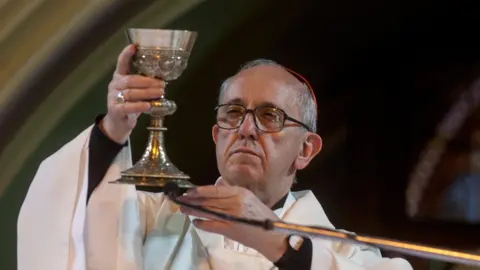 Getty
GettyWhen the former archbishop of Buenos Aires, Jorge Mario Bergoglio, left the capital of Argentina to participate in the Vatican’s conclave to elect the successor of Pope Benedict XVI, he did not know that it would be the last time that he would see his hometown.
The fact that Pope Francis has never returned to his country after having become the pontiff left Argentines with a heavy heart.
Speaking on Monday, the Archbishop of Buenos Aires Jorge Ignacio García Cuerva said that his parish was “orphans of a father who deeply loved his country and had to learn to become the father of the whole world”.
He also added that Francis becoming Pope “cost us the Argentines a little … Bergoglio left us to become Francis”.
It was a surprise for many – including Bergoglio himself – that he was elected to the highest post of the Catholic Church in the first place.
At the age of 76 at the time – a year more than the age typical of bishops and cardinals when they submit their resignation to the Pope – he was not considered a real candidate to fill the vacancy, according to analysts.
“When he left Buenos Aires for the conclave, he seemed a little sad; he was preparing to retire in a room in the home of priests in the district of Buenos Aires de Flores,” said Guillermo Marcó, a priest of the Archdiocese of Buenos Aires, the Argentinian newspaper Clarín.
However, Bergoglio would soon start a papacy that lasted 12 years.
His death was particularly felt in his country of origin, where seven days of national mourning were declared – because Argentina faces a man considered simple and humble, despite one of the most powerful offices in the world.
These qualities were congratulated by Elenir Ramazol, a nun who spoke to BBC Mundo during a vigil at the cathedral of Buenos Aires on Monday.
The fact that he was not returned to his homeland was “a sign of the total commitment he made to the whole Church, not only to his people, to his country,” said Ramazol.
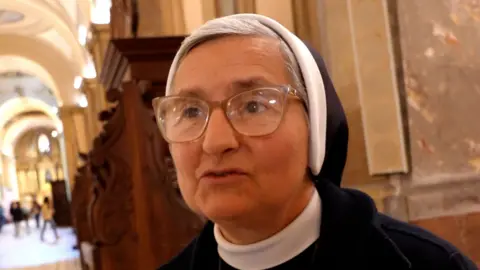 Mariana Castiñeiras
Mariana CastiñeirasGustavo Vera exchanged hundreds of letters with Francis, having become friends with him when he was still archbishop. He agreed that the pontiff always showed a lasting interest in what was happening in his country of origin.
“Sometimes he commented football, sometimes on tango, sometimes on cultural events,” said Vera, the head of the Alameda, an Argentinian anti-trafic and slavery organization. Francis followed the new Argentines “in detail,” he added.
During its papacy, Francis visited four of the five countries that frontal Argentina – but never his country of origin, although he continues to be very interested in this.
He was loved by many who cry now, but others remember him as a controversial figure.
The initial pride felt by most Argentines after the announcement that a compatriot would be the first Latin American pope has given way to disenchantment among some over the years.
A PEW Research Center survey suggested that the proportion of people who had a positive vision of the pontiff spent from 91% in 2013 to 64% in 2024.
Of six countries in Latin America interviewed, the highest drop in favorable attitudes was recorded in Argentina.
Conservatives in Argentina accused him of having undermined the historical traditions they have kept sacred, while the reformers hoped for deeper changes.
Critics said that he had failed to do enough to oppose the country’s brutal military dictatorship in the 1970s and 1980s and to criticize the complicity of certain figures of the Church.
Whenever he was asked about a possible trip, Pope Francis gave vague answers.
“I would like to go there. It is my people, but it has not yet been planned. There are several things to settle first,” he said the last time that he was publicly questioned on the subject, in September 2024.
Some Argentinian colleagues have found this hesitation difficult to understand.
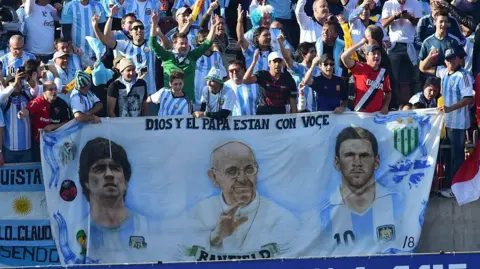 Getty images
Getty imagesThe absence of the pontiff has been felt more seriously in recent years, because Argentina has undergone a deep economic crisis, annual inflation reaching almost 300% and a sharp increase in poverty.
Mr. Vera suggests that Francis planned to visit, but had not yet done it because he wanted to prevent his presence from being used for political purposes.
“He always said that he would go to Argentina when he estimated that he was an instrument to provoke national unity, to help overcome the rift, to try to bring the Argentines,” said Vera.
The “Rift” refers to the vast Gulf of decades in Argentine politics and society between supporters and opponents of the peronism of the populist political movement, founded by the late President Juan Perón in the 1940s.
There is a widespread belief in the country that Pope Francis was a peronist – something he denied in a book in 2023, while adding: “If we had a peroneist conception of politics, what would not be the problem?”
The commentary was seized by conservative detractors who accused him of being too closely aligned with the causes of social justice and leftist policy.
Before taking office, Javier Milei, the current president who diabolized left -wing policy, even called Pope Francis “the representation of evil on earth” – although he has softened his tone after coming to power.
The two had a cordial meeting at the Vatican and President Milei officially invited the Pontiff to Argentina. And after the pope’s death, Milei said he was deeply painted by his loss and praised the benevolence and wisdom of the pontiff.
Some Argentines accused him of being too close to Cristina Fernández de Kirchner, a leftist leftist politician, who was president from 2007 to 2015.
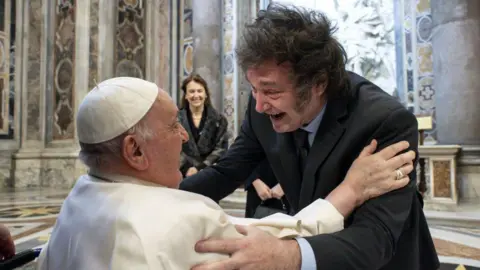 Getty images
Getty imagesBut according to Mr. Vera, the pope met with people “of all the political and social spectrum of Argentina”.
The friend of the late pontiff also stressed that, although there were criticism from Pope Francis in the media and the main urban centers, he was loved in other parts of the country.
Although he maintained his link with Argentina, said Verra, Pope Francis no longer felt that he belonged to a single country.
“Argentines believe that he was Argentinian, but in reality he was a citizen of the world,” he added.
It is a view shared by Alejandra Castro, a social worker who was one of the mourning people who met on Monday evening at the cathedral of Buenos Aires.
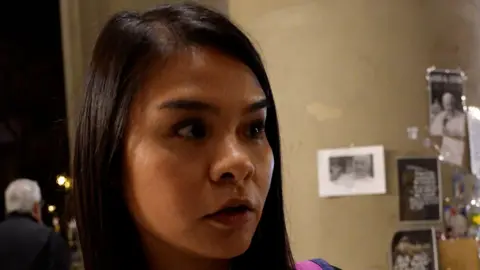 Mariana Castiñeiras
Mariana CastiñeirasArgentina was “still in its prayers,” said Castro. “In one way or another, he was always present, and I think it shows that in his heart, Argentina was always present.”
But Mr. Vera admitted that not everyone felt the same thing, and suggested that it was up to the Argentines to look in themselves answers: “Rather than blame Francis, we should ask ourselves what we were doing who meant that we do not deserve the visit of the pope.”



